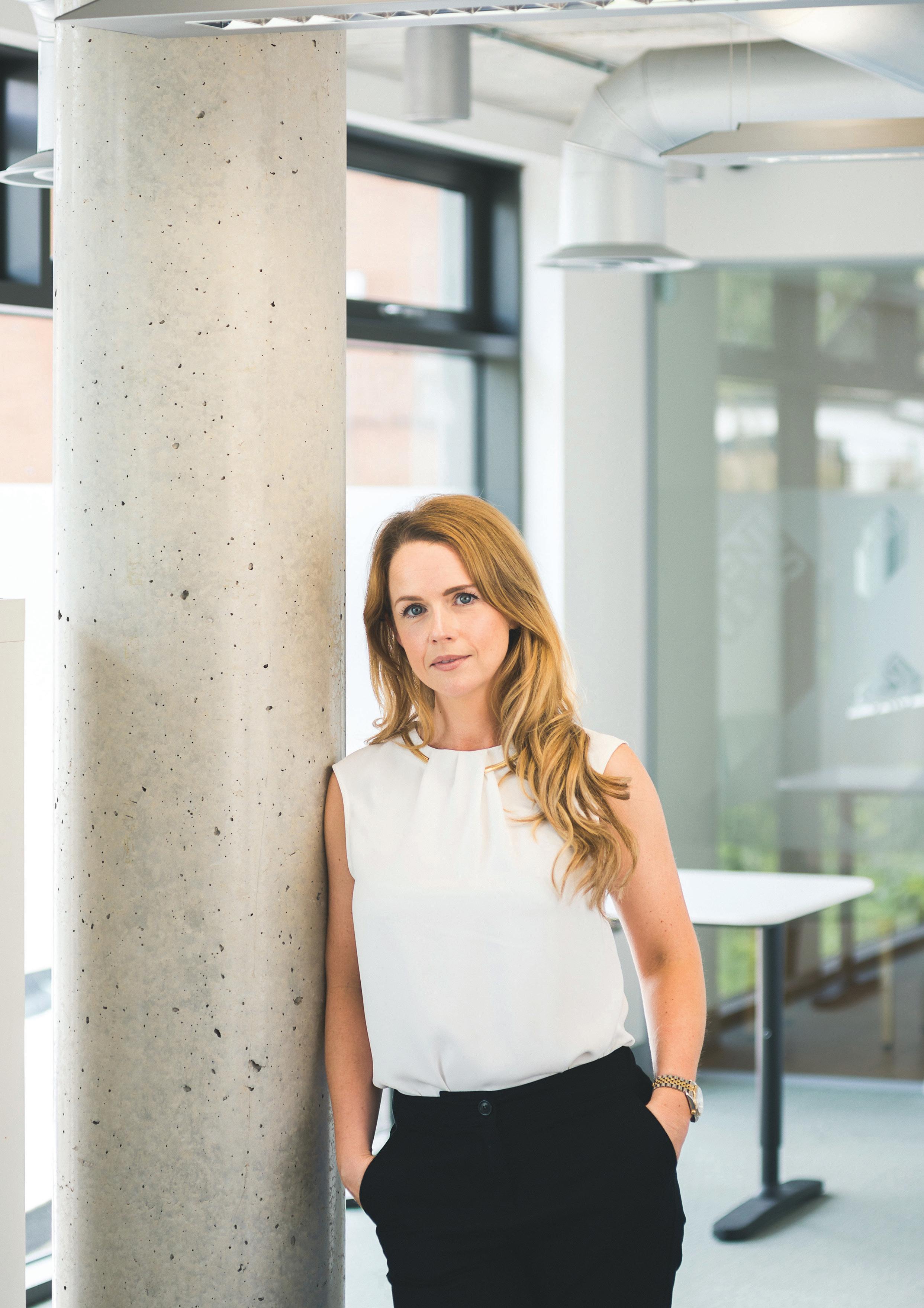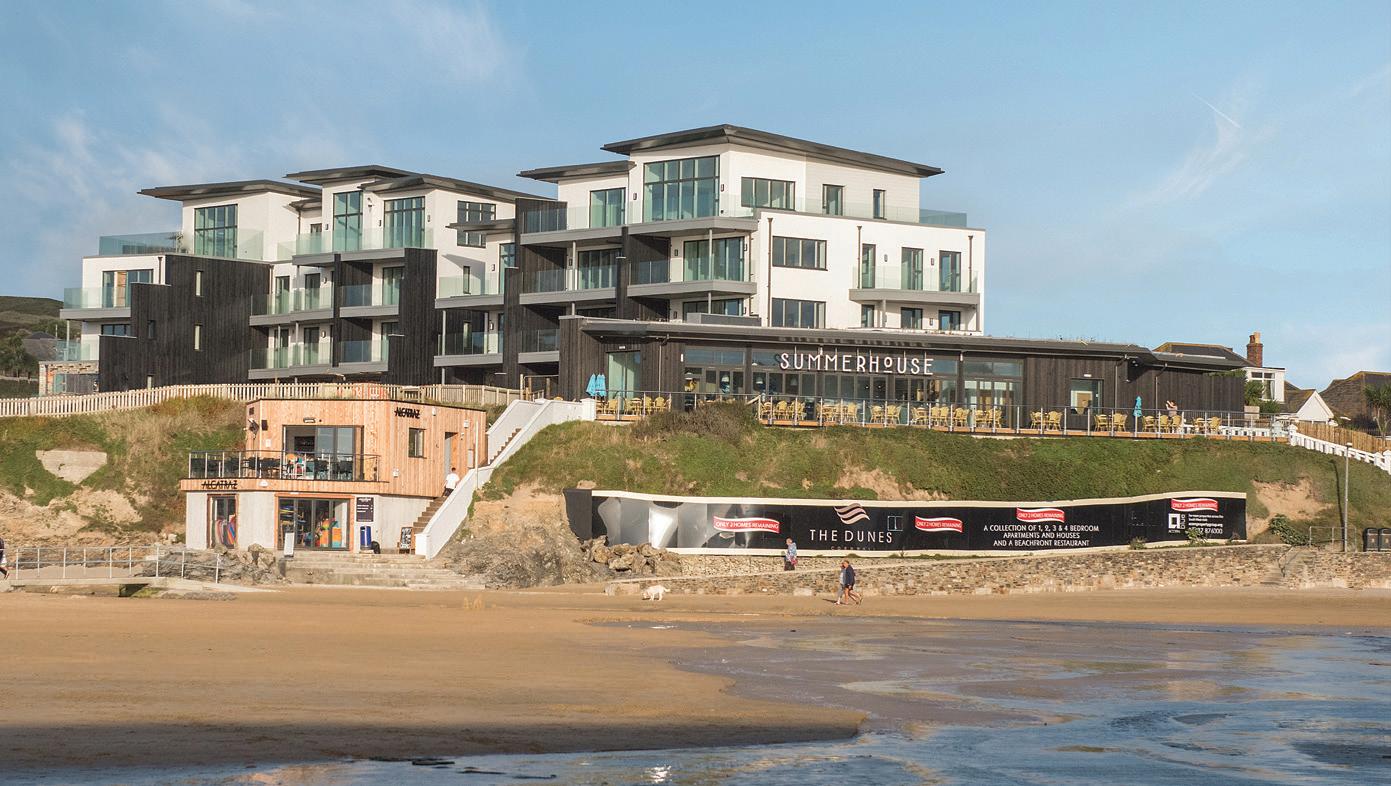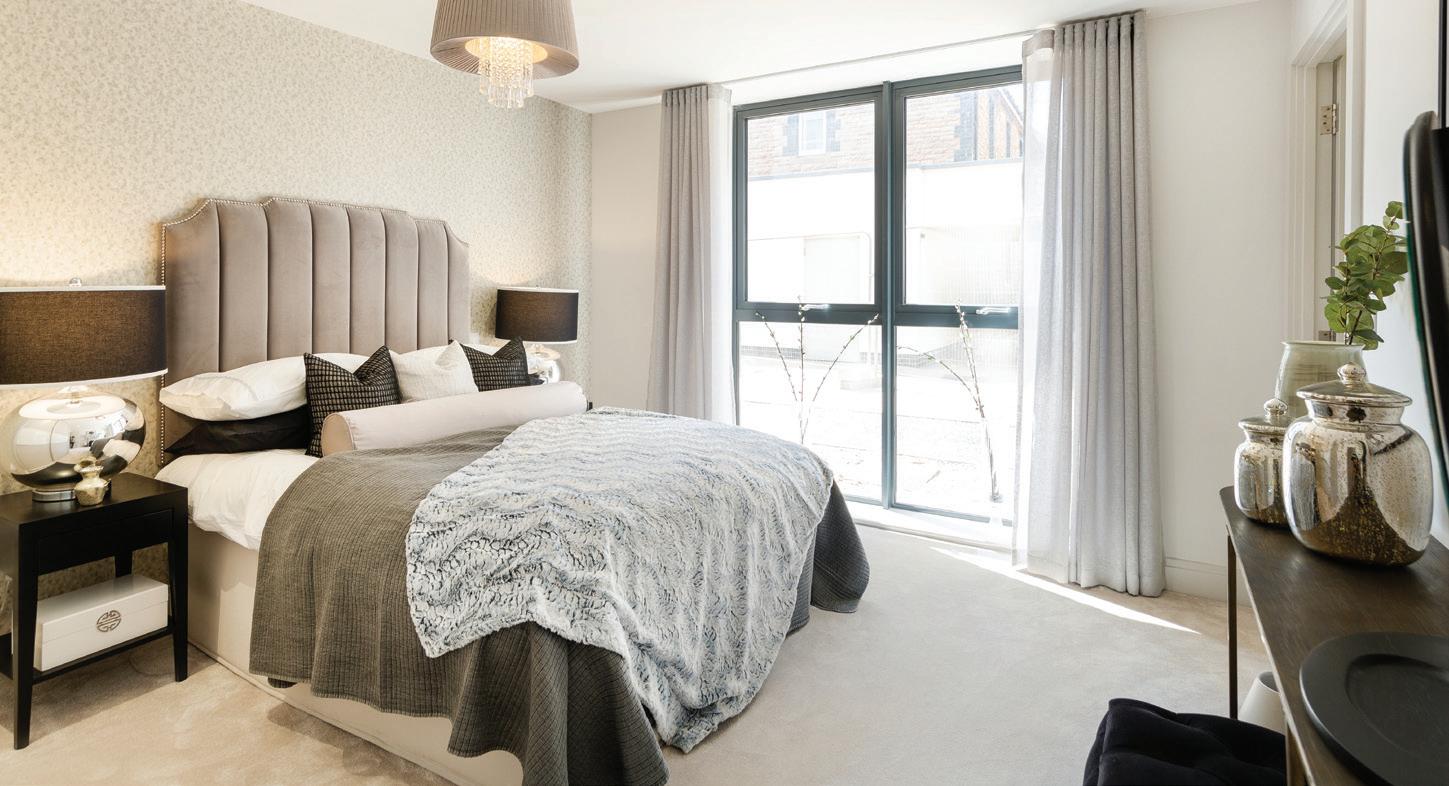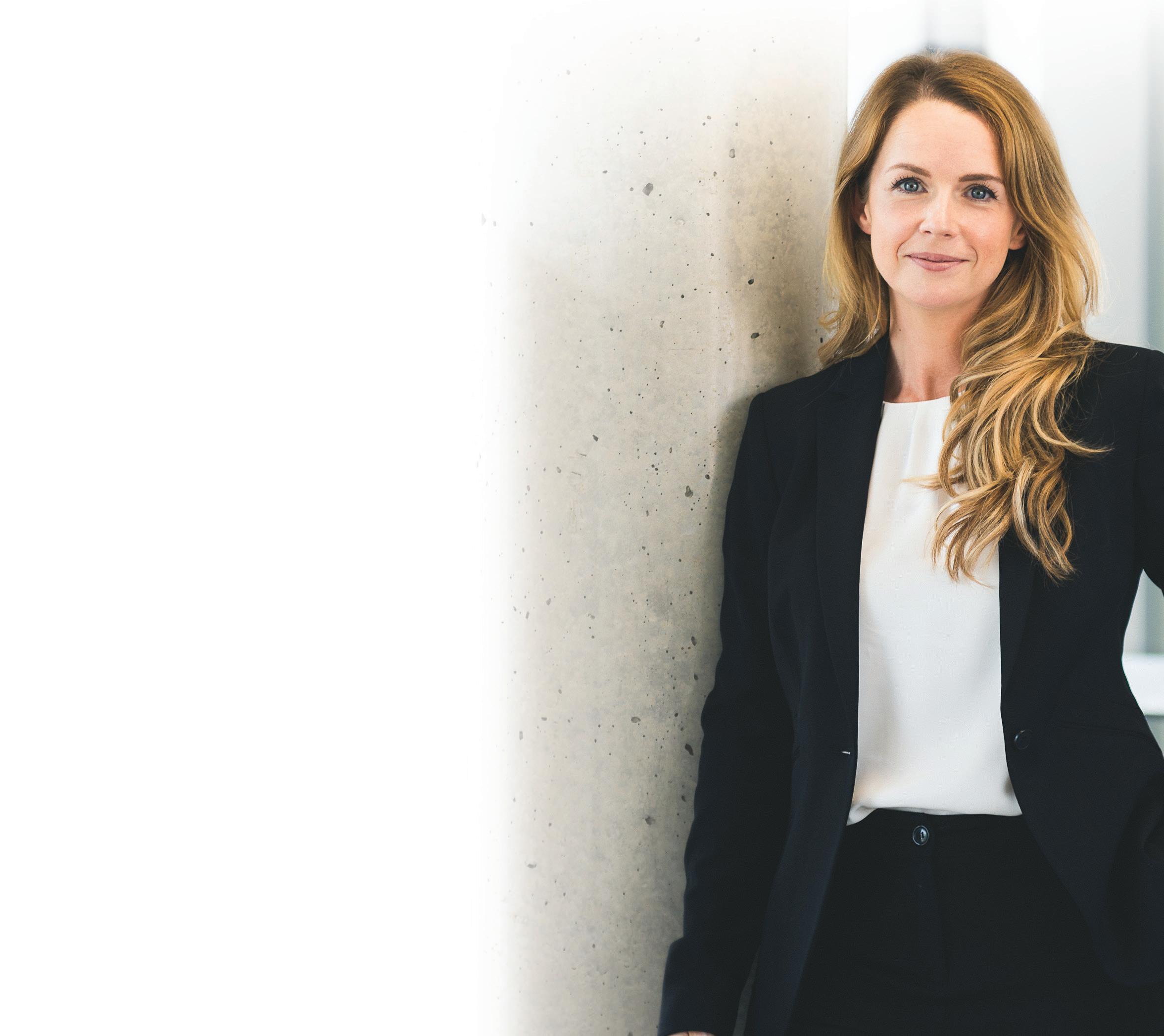
10 minute read
CEO INTERVIEW
Melanie Omirou
We caught up with Melanie Omirou, executive group managing director for independent housebuilder Acorn Property Group. In its 27th year, Acorn has projects across the south west of the country, including a number of high profile developments completed and ongoing in Cornwall, under its Acorn Blue brand.
What was your background before joining Acorn?
Originally I worked as a London estate agent. And that was what sparked my interest in property. I then went to work for Credit Suisse bankin property equities. It was 20 years ago that I joined Acorn and I have progressed significantly. I started as a funding assistant, because of my job history, then I went on to head up the whole of the funding team and from there became involved in every aspect of the business. Eventually, I became the managing director of London and I’m now the executive group managing director.
A perfect mix, through the estate agency, you had that passion for property and knowledge to combine with some banking experience. Because with developing, it’s one thing finding projects, but it’s another thing funding them.
Entirely, a project can’t commence unless you have funds to purchase the site. So yes, it’s a very important part of our business.
Of the projects you’ve worked on, which are you particularly proud of?
I have many! One in Cornwall is The Dunes in Perranporth. Set right on the beach, these new homes replaced an old run down hotel and transformed the appearance of the coastline. In addition to homes, it features a restaurant and coffee shop and has directly improved the local economy. Another coastal scheme but this time in South Wales is The Links. Set overlooking Rest Bay in Porthcawl, the scheme features the regeneration and conversion of a much-loved Victorian Grade II listed building. With links back to Florence Nightingale, the building was a purpose built convalescent home for the area’s industrial workers and miners. It was later used as a hospital in World Wars I & II. Left undeveloped and fading away for decades we are really proud to have been the ones to have given the building a new lease of life. In addition, we built a very sensitive extension that fits in seamlessly and adds to the accommodation offering.
It’s interesting you mention that it goes deeper than just building a nice property and for The Dunes it was quite a regenerative thing for the area as well.
Historically, Acorn really are regeneration specialists. We started off in southeast London, SE1, Tower Bridge, London Bridge, Bermondsey area. We pretty much, along with a couple of other developers, helped regenerate the whole area. So, we’ve learned a lot along the way. And I feel that that’s something we really brought to the regions that we now work in.
What sort of schemes do
Historically, you specialise in? Acorn really are One of the most exciting things about Acorn is that regeneration no two schemes are ever the same. Unlike many specialists housebuilders, we don’t have standard house type designs and layouts. We look at each project on its own merits and are design and opportunity led. We are not targeted by the number of homes we build every year, instead our focus is on providing interesting, complementary and sustainable architecture within the local area. We have a really broad portfolio of sites from brownfield and greenfield sites set in urban, rural and coastal locations to contemporary new build projects and the sensitive conversion of existing and listed buildings. While we are residential-led, we have also successfully completed a number of mixed-use and commercial schemes.


What is the split between residential and commercial?
It’s predominantly residential, I’d say it’s probably about 10% or 15% commercial. And if there’s any employment being lost, depending on what the building was, we like to make sure that that employment is replaced, and hopefully make a more exciting place for people to work in.
I can see that there’s a lot more considerations that you take into a development. It’s not just about looking at a site and thinking, oh, we can get 100 houses on there. It’s looking at a site and thinking, well, we could get 100 houses on that, but maybe it’d be better with 60 houses for an all-round better development...
Absolutely, you’ve actually described something that we’ve done many,times where we’ve shrunk it exactly, like you say, just to make the units bigger and more appealing. We’re confident in our product and everybody expects good specification, light and airy, everything should have a view if it’s anywhere near the sea.
Is that approach quite rare?
Yes, because sometimes banks will say there was a planning permission for 100 units, why are you only building 75? Because they can’t necessarily understand, but the banks that know us very well know exactly why we’re doing it and know what we deliver.
What are your main ongoing projects currently?
One is in the Cotswolds and it’s an absolutely stunning site. There was an existing lake and we have dug up lots of gravel to create two new private lakes and 75 houses on this site with 40 different house types. So, it’s a big job and every single house has to be thought about. There’s Cotswold village houses, your archetypal Cotswold stone houses, and some rural houses that back onto beautiful farmland and have beautiful green views. And they’re all scattered around beautiful listed buildings. And there’s three different forms of architecture there. So it’s a really good demonstration of what Acorn can do and construction is due to start early next year. Another one that we’re doing is Old County Hall in Truro. We are refurbishing the old town hall which has got huge windows, amazing high ceilings. And just like The Links of Porthcawl, we’re creating some new build homes at the back, but again, very sensitively, same roofline, seamlessly keeping the street scene if you like. The project has been submitted for planning, so hopefully construction will commence next year.
We’ve talked about the evolution of your career at Acorn, but where did it start for Acorn itself?
Acorn was set up by the founders , undertaking refurbishments of flats in North London. They just took it from there, built up a small portfolio and a good track record when they were offered a building in Bermondsey. That was the first Acorn development site. And as I say, in SE1, pretty much every building you can see along Bermondsey Street is an Acorn building. I think it would have been 2005 when we started looking at our first site in Cornwall.
Blue, originally worked in our London office. Regularly going back to Cornwall on the weekends to go surfing, he told us about a road leading to Fistral Beach where there was a tired B&B up for sale which he thought had The pandemic has development potential perfect for Acorn. just exacerbated and accelerated What are the main challenges faced the demand in the construction industry at the
moment in the UK?
To be honest with you, I think our biggest downfall in the UK is a lack of training and good apprenticeships, because we were very reliant on a European workforce and we lost a lot of skilled labour from Brexit. And I really feel that there should be a focus on education. The British workforce is aging now in the construction industry, and they really need to push young people through. And then the second challenge is building really efficient, sustainable houses. But there are significant changes and criteria that needs to be met that come with building low carbon housing. It’s costly, and it takes a lot of management within our company to get that right.
Are the rising costs having an impact?
Whilst the rising costs will undoubtedly impact us in the future, we have been relatively protected from this so far due to the severe shortage in housing and rising values. We are aware this won’t last forever.
With Cornwall, where do you think that interest came from?
Back in the early 2000’s Stuart Brereton who now heads up our Cornish region Acorn
What about the opportunities?
For us, medium sized developments, mixed use schemes that provide employment, as well as aspirational priced housing, are the kinds of sites we’re looking for. An example




of that is the old M&S building in Falmouth, which we’re also involved in. There is a huge vacant building, which is going to provide houses, flats, and retail premises. I think that’s the way forward, something that’s going to improve things for everybody in the immediate area; local people, people looking for second homes and bringing good retail always helps an environment. The other positive which has helped us immensely is the improved road system down towards the bottom of the county. Because that’s meant that we can look for opportunities in places that we shied away from before. Improved infrastructure has opened some more doors for us.
What are your strengths as a business person?
I would say in business that I’m very good at talking to people and much more importantly, listening to people. And by people, I mean, people that work with us in Acorn. We’re all a big team. I talk to peers in the industry as much as I possibly can, just to get a more rounded view of what’s going on. Importantly I’m always open to new ideas and initiatives. And as a company, we embrace change; we’ve never stayed stagnant. We move with the times, and that’s from internal staff through to what we build and where we build it. We are a modern company.
How has the industry changed in recent years?
The pandemic has just exacerbated and accelerated the demand to live in the south west, both for retirement, people at retirement age, genuine second homes. And by that I mean people that live there maybe four days a week but commute to Exeter, for example, or Bristol even, for the remaining part of the week. We are seeing a lot of that. What we found is that people were leaving London, and wanting housing in regions in commutable villages and towns where they work, or they were working from home and they wanted a garden and some workspace. Also, I think that because of the pandemic, specifically, they couldn’t travel abroad. So, all of a sudden, everyone was fighting to get down to somewhere near the sea and fell back in love with it. So many people I know said, “I haven’t been to Perranporth beach since I was 11 years old”. And people like that then want to buy a home there. Or people were moving, just completely selling up and relocating. So I think that’s been a significant change.
But is it difficult being a woman in a male dominated sector? And is it still male dominated?
Well, that’s the first thing I was going to say. I mean, particularly in Acorn, it’s definitely not where we are - we’re 50/50 male/female. And we don’t try and make that happen, it just happens, because we don’t define anybody’s skills by their gender. I have faced a few challenges as a woman, but I’ve never, ever let it affect me. And I just feel that if you do a good job, and you don’t define yourself We embrace as “a woman in a man’s world”, you’ll be change; we’ve respected. And that’s my never stayed experience, regardless of gender. I’ve always stagnant been respected and just treated as a business person, not a woman.
Final question. How do you see the next five years?
Busy, very busy, which is fantastic. I think one of our main aims for the next five years is trying to meet the demand across the sector. With serious concentration on local housing. And something I did an article on recently is about YIMBYism, as opposed to NIMBYism. We’ve found is that a lot of young people are getting more involved in planning applications in their local area, and they are voting pro new homes and new jobs. There are still quite a lot of people that are complaining about the supply of local housing, but then actively stop every planning application that comes across their way. So I think young people have got to start sort of pushing that forward. And I really think that’s where we’re going. I really do. It’s got to happen, so it will, and we’ve got a much more open minded, younger generation coming through.










